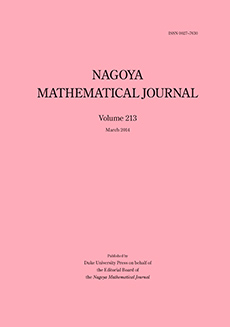Abstract
For real $x \ge y \ge 2$ and positive integers $a$, $q$, let $\Phi(x, y; a, q)$ denote the number of positive integers${} \le x$, free of prime factors${} \le y$ and satisfying $n \equiv a$ $\pmod q$. By the fundamental lemma of sieve, it follows that for $(a, q) = 1$, $\Phi(x, y; a, q) = \varphi(q)^{-1}$, $\Phi(x, y) \{1 + O(\exp(-u (\log u - \log_{2} 3 u - 2))) + O(\exp(-\sqrt{\log x} / 2))\}$ ($u = \log x / \log y$) holds uniformly in a wider ranges of $x$, $y$ and $q$.
Let $\chi$ be any character to the modulus $q$, and $L(s, \chi)$ be the corresponding $L$-function. Let $\tilde{\chi}$ be a (`exceptional') real character to the modulus $q$ for which $L(s,\tilde\chi)$ have a (`exceptional') real zero $\tilde\beta$ satisfying $\tilde\beta>1-c_0/\log q$. In the paper, we prove that in a slightly short range of $q$ the above first error term can be replaced by $\tilde\chi(a)\varphi(q)^{-1} \cdot x^{\tilde\beta}\rho'(u)(\tilde\beta\log y)^{-1} (1 + O((\log y)^{-1/2}))$, where $\rho(u)$ is Dickman function, and $\rho'(u)=d\rho(u)/du$.
The result is an analogue of the prime number theorem for arithmetic progressions. From the result can deduce that the above first error term can be omitted, if suppose that if suppose that $1<q<(\log q)^{A}$.
Citation
Ti Zuo Xuan. "Integers free of small prime factors in arithmetic progressions." Nagoya Math. J. 157 103 - 127, 2000.
Information




